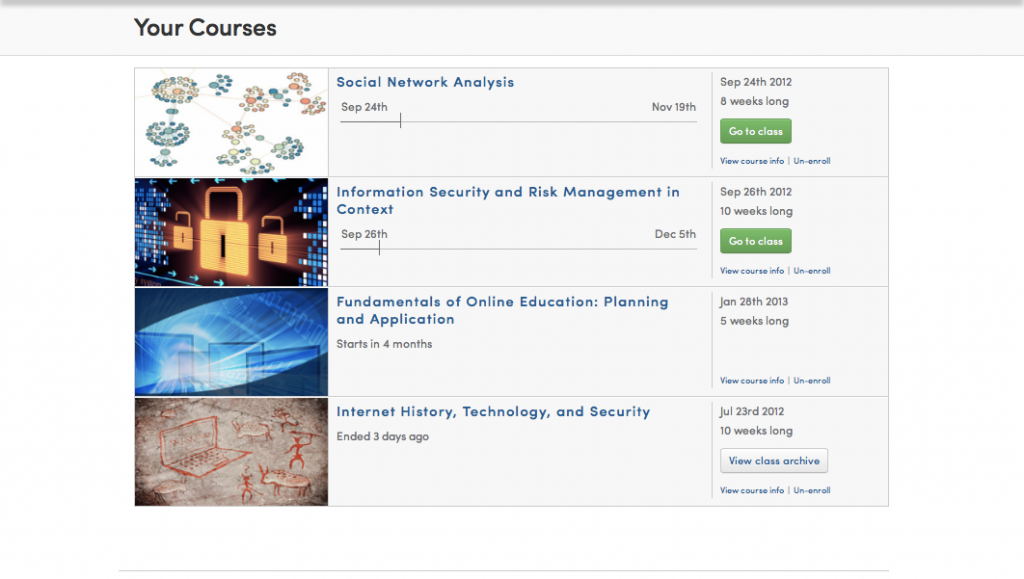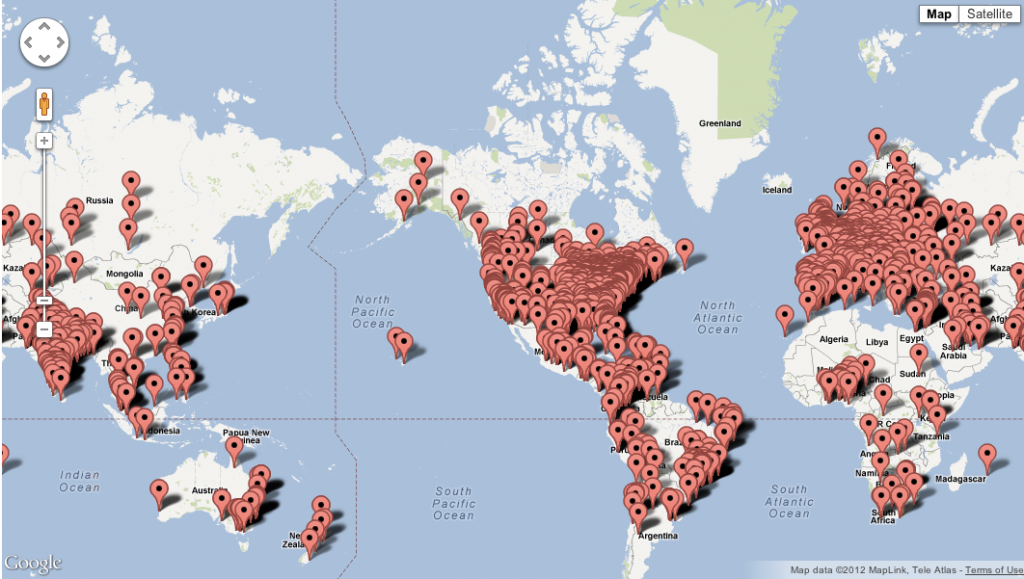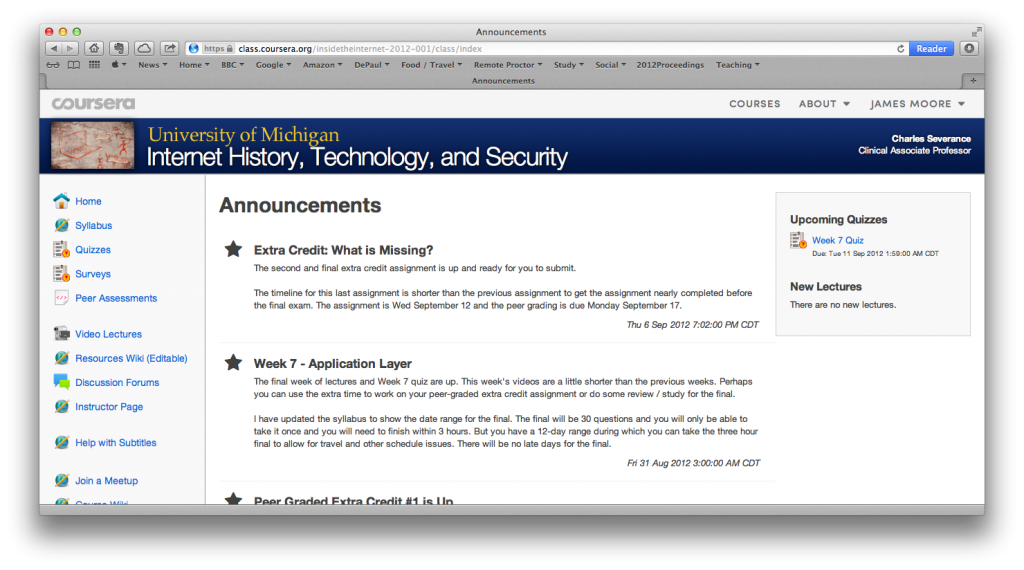So far I have taken three MOOCs, and I am currently taking another two (and I am enrolled in a Udacity course that I believe is study at your own pace – Introduction to Computer Science CS101, which I will look at way later in the year):
- Information Security and Risk Management in Context
- Ends 5th December, 2012
- Taught via Coursera
- Social Network Analysis
- Ends 19th November, 2012
- Taught via Coursera
- Internet History, Technology, and Security
- Completed – waiting for certificate
- Taught via Coursera
- Power Searching with Google
- Completed – received certificate (image)
- Taught via Google’s Course Builder
- Instructional Ideas and Technology Tools for Online Success
- Did not complete, but downloaded/read/watched all material
- Taught via Blackboard Coursesites
My purpose in enrolling in these MOOCS has been twofold:
- To continue my education
- To investigate MOOCs
- Is there a business model?
- Do they “work?”
- What instructional design strategies are employed?
- How will they compete with traditional education?
- Is assessment possible on a large scale
- etc.
So here are some more observations…. (Part 1 can be found here)
Internet History, Technology, and Security
The instructor (Charles Severance) has been very good at communicating with students since the course has officially ended. There have been several email updates sent out to the group alerting us to the certificate status. This is good in of itself, but what is even better is that he recorded a “reflection / summary lecture” which he had planned to:
“talk about how the class went, what worked and how I would improve the class, and share some of the data about the class with you”
This is fantastic, and demonstrates what I find most powerful about the MOOCs – the way in which the large number of students combine with the open nature of the MOOC philosophy to rapidly iterate improvements (providing faculty, instructional designers, technologists, etc. are willing and prepared to make changes).
Chuck shared some data on where the students came from, which can be seen by following this link to Google Maps.
The reflection video shared some great data on the student population, but this data I found particularly interesting:
- Number of students signed up: 45572
- Number of students completing week 1: 1164
- Number of students who took the Final: 5401
- Number of certificates: 4595
Chuck then shared his thoughts on what went well, and what he would do differently. I don’t think he will mind me repeating this here given his adherance to openness and transparency:
Worked Well
- Using Twitter as the way to contact me
- Discussion tool is outstanding
- Multi-take quizzes with automorphing questions
- Lecture video format with me looking at the Cintiq
- Discussion forums and their voting
- Cognitive load from the forums to me was manageable
- Mail to the class needed to come from me
- Office hours as small focus groups to help me improve the course
Things He Would Do Differently
- Better Welcome Lecture
- How to use the software lecture from Coursera (i.e. like resources)
- How and when to use the “flag” icon
- How do Late Days work?????
- Describe community communication guidelines – when we will delete a thread
- Delete threads more often
- Faster lecture translating
- All writing assignments are extra credit (because this is an intro class)
- I still don’t get reputation points and how I should use them
- More student editable spaces
- Better way to identify natural leaders in the community and give them ways to communicate broadly other than “+1 votes” in the discussion
- Split lectures at week boundaries (oops)
- Add a “breath/pause” during lecture recording to allow me to later decide where to put a question.
- Come up with an extensive preview so people don’t register just to peek
- Tell late entrants that after week 3 they will not likely get a certificate – perhaps even close registration – you can go on a wait list and see the materials but not take the quizzes
- I would like to come up with a selfpaced version – but the software would need to be different
This really gets to why the course was so successful – a professor who felt passionate about making improvements to the course as it was being taught, and then applying longer-term changes for the future. He also was extremely approachable using Twitter, the discussion boards, and traveling office hours to communicate.
I was lucky enough to participate in the Chicago office hours, and found this to give me more of a connection to the course.
It gets even better – Chuck is intending to build a sequence of MOOC courses that build upon each other, and he is personally signing all certificates sent to him.
It has been a definite pleasure taking the course.
Social Network Analysis
This looks to be the more “hands-on” of the various MOOCs, with applications to install and data to process. I have some assignments to complete and need to dig in deeper. I am happy with the way the course is going, and know that this will stretch me.
Information Security and Risk Management in Context
There has been an undercurrent (and sometimes more than that) of dissatisfaction in the discussion boards the past week. The areas that several of my fellow students feel less than happy are:
- Announcements that the videos cannot be downloaded.
- Reuse of older classroom videos.
- Promotion of the certificate programs ($1,025 for noncredit or $2,055 for graduate credit). Here the wording and frequency of this information seems to have rubbed people the wrong way.
- A feeling that the course was rushed to meet a deadline, rather than waiting to release something more polished later in the year.
This is the first Coursera course where textbooks have been required/recommended. What I think would have worked better here would have been:
- Selecting entirely digital required reading (rather than having to find and order a physical book).
- Providing the required/recommended reading information earlier in the course.
However, I am finding the content in this course particularly relevant to my interests, and look forward to future weeks.


